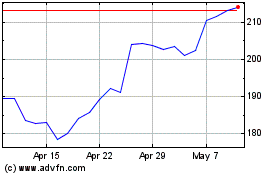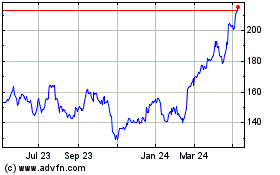Impatient Barclays Investors Await CEO's Plan
February 28 2016 - 11:28PM
Dow Jones News
By Max Colchester
LONDON--In his first three months as Barclays PLC chief
executive, Jes Staley has redrawn the bank's global footprint,
reshuffled several top executives and pressed the flesh with
everyone from the U.K.'s prime minister to U.S. regulators.
On Tuesday, when Barclays reports full-year earnings, investors
will get their first insight into the 59-year-old U.S. banker's
vision for the lender. At stake: salvaging one of the U.K.'s last
remaining universal banks.
Following a bold postcrisis expansion, Barclays is wading
through a multiyear restructuring. Investors are getting impatient.
The bank's stock has slumped 40% in the past 12 months.
Barclays's results are expected to be lackluster, weighed down
by weak performance at its investment bank in the fourth quarter
and lower returns as its African unit is pummeled by falling
commodity prices.
Recapitalizing the business is "their number-one issue," says
Joe Dickerson, banking analyst at Jefferies. Faced with this
pressure, Mr. Staley is expected to continue pruning the lender to
focus on its businesses in the U.K. and U.S.
The bank has been working on plans to gradually sell off its
African division, according to people familiar with the matter. The
unit is expected to be de-consolidated from the lender's accounts,
these people say.
Barclays is also expected to accelerate the sell-down of
unwanted assets and put cash aside to address some of the range of
litigation problems hanging over the bank.
The prospect of falling investment-banking revenue "could prove
a catalyst for change," say analysts at J.P. Morgan Chase & Co.
Hundreds more jobs could go at the unit and capital could be
shunted to other businesses, analysts say.
A Barclays spokesman declined to comment.
Barclays is a difficult ship to right. A cultural rift remains
between its U.S. investment bank, largely acquired from the carcass
of Lehman Brothers, and its profitable but staid U.K. retail
business. Employees at the bank complain of a continuous churn of
managers and byzantine bureaucracy. For instance, one consultant
was surprised to discover the bank still paid cellphone
subscriptions for staff that had quit the lender months
earlier.
The bank is also in regulatory crosshairs. Barclays must split
its U.K. retail unit from its investment bank by 2019. A big issue
is ensuring the investment bank can continue to fund its activities
as a stand-alone unit. Big corporate clients may be served from the
entity that will house the investment bank to help fund it,
according to people familiar with the matter.
In the U.S., regulators are forcing Barclays to move its
American activities into a holding company. The unit may need a
capital injection of up to $6 billion, according to analysts from
Bernstein Research. It is unclear where these funds would come
from.
U.K. officials are increasingly wary of crippling Barclays's
investment bank. The bank is one of the biggest market makers in
U.K. government debt. British authorities pushed for the bank to
keep an office open in mainland China even as it announced plans to
cut 1,000 jobs as it closed businesses across Asia, according to
one Barclays official. The U.K. government is trying to make London
a trading hub for the Chinese yuan.
To help him overhaul the bank, Mr. Staley handpicked several
staff from his former employer, J.P. Morgan. Jonathan Moulds, known
for his collection of Stradivarius violins, was axed as chief
operating officer and succeeded by J.P. Morgan veteran Paul
Compton. The bank is hunting for a new boss for its investment bank
after Tom King stepped down as chief earlier this month.
The Barclays boardroom has also been overhauled. Former Standard
Life PLC Chairman Gerry Grimstone joined Barclays as deputy
chairman late last year. He is being touted by some industry
watchers as a successor to current Barclays Chairman John
McFarlane.
Mr. Staley is working to avoid the pitfalls that befell Bob
Diamond, the last U.S. investment banker to run Barclays. Despite
efforts to assimilate into London society that included becoming a
vocal supporter of a local soccer club and attending the annual
Chelsea Flower Show, Mr. Diamond's confrontational style irked
politicians. He was pushed out in 2012 following a rate-rigging
scandal.
So far Mr. Staley's more low-key approach has met with
approval.
"He seems like a very nice chap," says a member of Parliament
who recently met with him.
Write to Max Colchester at max.colchester@wsj.com
(END) Dow Jones Newswires
February 29, 2016 00:13 ET (05:13 GMT)
Copyright (c) 2016 Dow Jones & Company, Inc.
Barclays (LSE:BARC)
Historical Stock Chart
From Jun 2024 to Jul 2024

Barclays (LSE:BARC)
Historical Stock Chart
From Jul 2023 to Jul 2024
